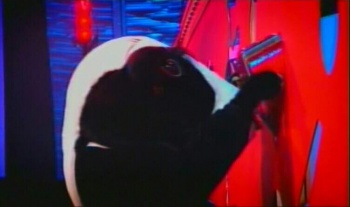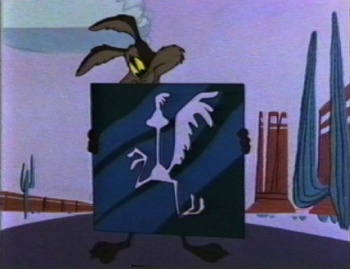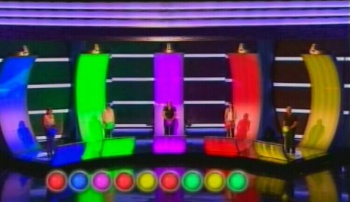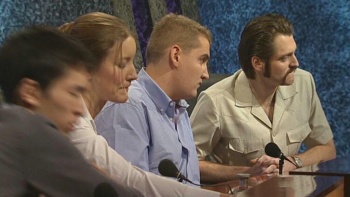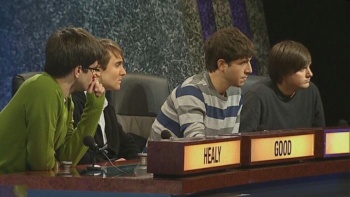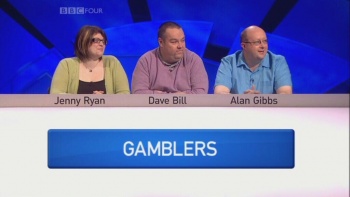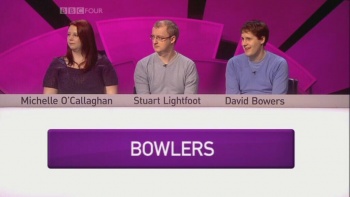Weaver's Week 2010-03-28
Last week | Weaver's Week Index | Next week
Contents |
Push the Button
Gallowgate for ITV, Saturdays from 27 February
It's a year since ITV staked the family silver on The Colour of Money. It was an ill-considered gamble, like wagering that the Queen will wear a mauve hat, or Alistair Darling will deliver the budget wearing a black tie, a bet on this colour was a sure-fire loser. The programme was pulled off air a week early, and even the attempt to burn off the episode over Christmas was cancelled owing to sheer tedium.
There's no danger of a yuletide burnoff for Antan Dec's new show, but only because it's recorded a couple of days before transmission. The plot to Push the Button is very simple. On Monday, two families received a visit from ITV's most popular entertainers, telling them that they'd be on prime-time ITV this Saturday night, and they'll be seen by an audience of, literally, people. The two teams of five relatives gather in the ITV studios, sit on the ITV sofa, enjoy the ITV hospitality, and are given £100,000 of ITV's money. Just for turning up.
Brilliant this, isn't it. A visit from bona fide pop stars, a trip to London, and a six-figure sum. But there's a recession on, don't you know. ITV hospitality isn't what it once was – whereas panelists were once given a slap-up nine course meal served off Lord Russian Emigre's gold platter, they're now lucky to get a slice of lukewarm coffee and a custard cream. Between them. And that £100,000? Some of it's going to go.
Over the course of the programme, all of the members of the family will be given a test. Just the one. Though the games change each week, the arrangement doesn't. Round one is always an individual test, one person racing to complete a task as quickly as possible. While they're trying to do the job, money is draining away from their prize fund, at a rate of about £8000 per minute. The tasks are all a little silly – in the sample opening episode, it was to take various objects off a conveyor belt, and place them on the other side of a division by passing the object through the appropriate apeture. At no point is the contestant asked to get themselves to the other side.
Round two is a test of skill and intelligence. Again, the opening episode asked the competitors to count the number of teeth displayed in the mouth of a shrunken model of Simon Cowell's head. A later episode invited the players to memorise the Big Book of Soap Deaths, every character who had been deaded at least once (and possibly more often) in various soap operas. We presume that this required the players to memorise the face along with the character, soap, and means by which they were killed, though that wasn't made sufficiently clear in the broadcast. Each round has multiple parts, and the winner of each part is able to take some money off their opponent's total.
Round three is a performance challenge. While visiting on Monday, Antan Dec give instructions to help their chosen victims prepare for a particular task – playing the trumpet, or learning how to yodel. A hundred members of the audience vote on who they think gave the better performance, and the winner of the vote removes more cash from the opposition. The fourth and final round is like the first, only played by both families at the same time, with money running off both of their clocks. Whichever group has the more money at the end of the round gets to play for the jackpot, which we'll get to a little later.
Now, what works in the main show, and what doesn't? The programme gets off to a terribly slow start, thanks to the introductions and explanation of the rules, it's almost ten minutes before the opening game gets under way, and nigh-on twenty minutes (and one commercial break, and an Antan Dec sketch) until game two begins. We've no objection to commercials going out on a commercial channel, so long as there's a decent amount of action in the minutes between. For Push the Button, the opening stanza can be almost entirely avoided.
Nor is it possible to play with many of the games at home. Yes, we can play along with the contestants counting the teeth in the scale model of Simon Cowell's head, but we can't do the dances, or play the instruments. Shows like The Crystal Maze also lacked a way for the viewer to play along, but made it clear by judicious camera work what the player had to do. Too often, games on Push the Button are spectacle for spectacle's sake – the Dead Soap Stars challenge amounted to little more than an extended commercial for ITV's daily drama shows. When viewers can't compete, they should be able to enjoy the spectacle. When segments are neither playable nor interesting to watch, the question of "what's on the other side" will spring to mind.
All of this is a shame, because it's clear that the hosts, contestants, and studio audience are all having a smashing time making the show. There are many little bits the show does right – consolation prizes for the losing family (salt and pepper not included), the guinea pigs demonstrating each game (grown men and women dressed in furry suits), everyone getting a trip to the ITV Dressing-Up Box (brown overalls for a sorting office, chef's hat for a cookery game, and so on).
But this fun doesn't include the audience at home. Why might this be? After seeing a few shows, our tentative conclusion is that everyone's playing a little too safe. The designers of the stunts and challenges have made sure that they don't give unexpected results, to the extent that the show doesn't make for good television. One show had a geography quiz, moving various landmarks to their place on a giant map of the world. It worked for the players, but the television presentation was a mess of seas and oceans and things, and we don't think the correct answers were clearly spelled out. It looked messy on screen, even though it made sense in the studio.
By about two-thirds of the way through the opening show, we were thinking, "This is The Generation Game done not quite as well." Bruce's show – well, Bruce's 1970s show – had a simple concept. Here is an expert showing you how to do something; now you have a go. The programme was shot without re-takes, without much stopping and starting, and when it was good, it made for far better entertainment than Antan Dec's new show. Could they adapt some of the ideas: take the see it, do it principle for something more modern than conjuring tricks? Could there be a semi-improvised sketch with the host and some members of the families playing parts?
Perhaps; perhaps not. Push the Button revolves around the titular button, around not losing what you've already got. There's a certain negative energy to the show, like a silhouette picture: there's a black area, a white area, and all the interest is at the boundary between the two. Silhouettes are interesting, but most people will find them tedious after a short while.
On to the finale, which is really the weakest part of the show. While Generation Game had the conveyor belt, and Saturday Night Takeaway its One Question Only giveaway, Push the Button is working with a giant game of Simon. Remember a sequence of lights and notes, and repeat it back. The sequences lengthen from three to 11 notes as the prize increases. All each person has got to do is remember their position in the sequence, not the entire sequence. The team's allowed one failure, they may be allowed to hear a sequence again, and if they do go wrong, they can gamble to increase their winnings by one person getting a seven-note run on their own. It's an anti-climax.
How would we re-structure the game? Teams of four, very briefly introduced, before a sequence of games and challenges. The basic concepts they've got tend to work, we wouldn't change that much. For the finale, pilfer the Very Amateur Dramatics idea from Generation Game, with Antan Dec performing a different five-minute sketch with the families, each member of the team giving some lines, and have the audience vote on which performance they enjoyed the more. That would be the winning family, and they take away the remaining money. Other formats are available.
There's clearly the germ of a great television show in there. Somewhere. The trouble is that it's not getting out just yet. We hope Antan Dec will be able to go away, figure out what worked and what didn't, and come back with a far stronger series.
Postscript: The series did come back in 2011, and received a second review.
University Challenge
Semi-final 1: St John's Oxford v Imperial London
There's one good reason why we've not made any cracks about the Mastermind series dragging on terribly: it's because University Challenge has been dragging its feet over who will qualify for the semi-finals, spending six weeks eliminating the four sides that would have gone out if the quarters had been straight matches. What would we do? An all-against-all semi-final league, with the top two sides meeting in the grand final. That's simple enough for any viewer to understand, even the competitors' parents. Even the host could work it out.
One of the quirks of this format is that St John's is the only undefeated side left in the tournament. If they lose tonight, their record of four wins and one loss will be the same as Imperial's, but it's the London side who will make the final. Curiouser and curiouser. We'll begin with Word of the Week, "evolution", which Thumper was going to say doesn't appear in early editions of "...Origin of Species", but doesn't get the chance. First words of titular Shakespeare characters get St John's further off the mark, and there's a good guess on the origin of "Arthur's Seat", the place in Edinburgh.
A name-that-decade starter has guesses all over the shop, and there's some impressive working-out of the names of characters in "Wind in the Willows". St John's find that if they say "The Loop of Henle" to every question about the kidneys, they'll be right eventually. They're also right on the first visual round, UN specialist agencies, and the Oxford side has opened up a substantial lead, 105-0. Imperial start pulling it back with the next starter, only for St John's to get the city of Cologne, and a round of words containing all five vowels just once. Did we realise that UNSPORTSMANLIKE contains ten consonants? No. Then this happens:
- Q: The sequence of numbers equivalent to hundredweights in a ton, 10 to the power 0, the age of majority, Vivaldi's Seasons and baker's dozen are to be found in the top right-hand quadrant of which piece of games equipment?
Best. Question. Ever. Of the week. Pythagorean triples appear in the next starter, and that was a sequence in The OC series 1. Imperial know little about Gray codes; it's too long since we took coding theory. St John's get a set of bonuses on definitions from The Devil's Dictionary, which is always a great deal of fun. The audio round is on music from films; Kieran Healy wins the race to the buzzer after about half a note, but St John's lead is a comfortable 135-60.
Comfortable, but it's not a winning score. Imperial's knowledge of middle-European geography helps to reduce the deficit, knowing both Trieste and the definition of Riviera. F11 means full-screen in Windows? Not where we're at, it means make a bar chart of the points won by Imperial so far. Ooh, a question about capital Greek letters, and how Ν and Ζ are rotations, as are Μ and Σ. It's almost as if St John's most famous alumna has dropped by ten minutes early. There's some rare honesty from the Oxford side, as they confess they don't have a clue on two answers. The Oxfordians are also shown to be generous, applauding the Imperial side when they give correct starters; we're sure the London side are doing the same, we just don't get to see it.
The second visual round begins with the words "Name that engraver", and we find ourselves saying "Hogarth" before we've seen the picture. St John's lead by 195-125. Right, we'll explain the next one to you in Only Connect style. What comes fourth in the linear series: (0,3) (1,6) ..? Thumper's verbiage confuses the sides:
- Q: If a linear function, Y = F of X, takes the value of three when X equals zero and six when X equals one, what value does it take when X equals three?
Imperial gets full marks on the next set, but St John's do well on time periods, and the lead of 85 with about three minutes to play is surely unbeatable. Still, Imperial will give their best shot, knocking down islands in country names in even less time than the Strategists can crack a wall. St John's respond with governments with two heads, and just miss ten more points as the gong goes while they're giving the correct answer to the next starter. The winning score: 260-170.
These sides are seriously good. George Woudhuysen was the best buzzer for St John's with six starters, the team was correct in 27/39 bonuses and had one missignal. Imperial were led by Kieran Healy, seven starters as the team made 18/27 bonuses with two missignals. The overall accuracy rate was a stonkingly good 67/92.
Next match: Manchester v Emmanuel Cambridge
Only Connect
Quarter-Final 4: Gamblers v Bowlers
"If this were the Victorian era, they'd be displayed in sideshows, so that everyone could marvel at their unusual skills". says the host of our teams. "So, in a very 21st-century sense, let's gawp at the freaks." Charming. The Bowlers reckon they're too young for questions on "The Goons", which is surely true.
The Gamblers have won the toss and elected to bat, and kick off with the audio round. They recognise The Offspring and The Beatles, but their offer – songs written about family members – is wrong. Bowlers offer "sons", and suggest that Victoria is a cruel and harsh taskmistress. She's bright, she's scary, but she's a darling really. Gamblers are right on their second attempt with this question, but that's scoring nothing. Bowlers get the picture clue, try "longest running", and the Gamblers almost have it – these works were all named after other plays. The Gamblers get Yulia Tymoshenko and Violeta Chamorro, the only female leaders of their countries, and three points.
Bowlers have some sort of god, clearly, but it takes until the last moment for them to pick that they're the dedicatees of some of the Wonders of the World. Gamblers find their world is easier in black and white, stripes to be particular, and two points there. Bowlers finish the round with what looks like a wordplay clue, it's words made out of two smaller words that can be swapped around. Two good points, but the Gamblers lead 5-3.
Gamblers lead off in round two, and they know their time zones very well, ending up on Greenwich Mean Time. And do remember to put your clocks forward. Large moons give the Gamblers a bonus, and their own question has a discussion about stringed instruments, with one, two, three, four strings, so there are plenty of correct answers and two points. The side mistakenly thinks that a violin has five strings, but even the guesses count.
Bowlers have the picture clues, which they believe to be an S-bend, T-junction, U-boat, and offer a V1 doodlebug thingummy. It's v. good, for 2 points. Gamblers begin a sequence from Cantona going downwards, which finishes with Brian Cant. Victoria saw him in a car park once. The Bowlers get a question that's about roulette betting, their offer is wrong, and the Gamblers pick up the bonus point. Their lead is now a substantial 15-5.
All the Bowlers can do on the walls is to pull level and hope their opponents get a grid from hell. What does it tell us about this team that their first thought on "Cheeky" is girls. They go for record labels, and get a group fairly quickly. Synonyms for "cold" is their next idea, but they give up on that and go for types of monkey. There is a set of synonyms for cold, and the final link is words that sound like countries. Victoria doesn't say that one. Ten points!
The Gamblers start thinking about coffee and computer languages, but that doesn't work and they try various people called Monty. That works. They discuss programming, and gold. They're convinced that K7 is a computer language, and that Python isn't. Is Bourbon a type of coffee? They're heading down that road, but time expires with just the one connection made. Computer languages, types of coffee (that's where K7 goes), and ___ monitors. So close, but so far away. Four points!
Which means the Gamblers have a 19-15 lead going into Mssngv Ls. Literary lovers kicks off this section tonight, and that gives the Gamblers a 3-1 lead. Quotations from famous speeches is next, which ends in a 1-1 draw. Playing cards (including ones from the Tarot and Happy Families decks) is a 2-2 tie. Red wine grapes goes to the Gamblers by 2-1, and time is running down. Bowlers pick up a point on the one legal occupation, but it's not enough: the Gamblers have won by 27-21.
Next match: it's semi-final 1! Archers Admirers v this week's winners
Mastermind
Heat 23
Kathryn Johnson gets the show under way this week, and she's taking Victorian and Edwardian poisoners. In the years before guns became widely available, the most fashionable way to commit murder was by poisoning the victim, usually in order to inherit their riches. Writers from Dickens to The Two Ronnies used this trope, but the round concentrates on actual poisoners and their poison, which had a 70% success rate when done properly, such as being administered in a Dundee cake. We can think of worse ways to go. And we can think of worse rounds, this one ends on 15 (1).
Daniel Tudor is going to tell the country about the Life and Music of Lead Belly. Huddie Ledbetter (c 1885-1949) wrote such classic songs as "Rock Island Line" and "Goodnight, Irene". Born in Louisiana, Belly had a hot temper, spent time in prisons, and eventually became a regular performer at political rallies. We have to say that we'd never heard of this performer until we did the research, so we've no idea how easy or hard the questions were, and the round ends on 8 (3).
Andy Lie takes the Life and Work of Bishop John Robinson (1919-83). Robinson was the Bishop of Woolwich, who came to fame after his appearance for the defence in the "Lady Chatterley" trial. He's best remembered for the book Honest to God (1963), in which he set out the basis of his liberal Christianity. The publication caused a short-lived but hot-tempered debate amongst the religious classes, and it attracted the attention of the national media. We don't claim to understand the theological arguments in the slightest, but we do believe Mr. Lie is the first freelance interfaith advisor ever to appear on the show. A nervy performance ends on 7 (2).
Last up is Gavin Fraser, taking the History of the Football World Cup 1930-1958 (er...) It's a competition to find the best national football side on the planet, so long as one believes that national sides represent the optimal method to determine quality. The round is like the regular winners in the finals tournament: gets off to a good start, has a bit of a stutter midway, and ends with a very respectable 13 (2).
We'll scoot through the first two contenders' rounds, because it's clear even before they begin that they're not likely to win. Andy Lie gets a really nasty question, asking after the title to a pop song from its second line, and finishes on 10 (5). Daniel Tudor is asked about the career of HRH Sir Sebastian Coe, and ends his round on 16 (9).
The top six runners-up:
- John Cooper 29 (3)
- Ian Scott Massie 26 (2)
- Les Morrell 26 (3)
- Colin Wilson 25 (0)
- Peter Cowan 25 (2)
- William de Ath 25 (4)
Now, it's generally held that young people – and Gavin Fraser is a student, and looks young – will crumble in the general knowledge round. This contender, sadly, is no exception to the rule, getting the first few questions right then only picking up answers here and there. Still, he manages to unscramble Smallhead's mangling of Lady Gaga's birth name (Stefani Germanotta, as in an aquatic mammal from Deutschland) and finishes on 22 (8). Not quite a winning score, we feel, but still a very good one.
Kathryn Johnson requires eight to win outright, though seven will probably do. She kicks off with Alan Freeman and "panorama", and the correct answers just keep on coming, dredging Are You Being Served? from somewhere, and guessing that Mr. Tate was the sugar magnate who endowed an art gallery. The final score is a quite remarkable 30 (3), the first 30 of the series, and she's surely going to be a force in the next round.
This Week And Next
Radio 4's Feedback programme floated an idea last week, to the effect that incorrect interruptions in Just a Minute should be penalised with points deductions. We don't think this would be wise, because the programme is an entertainment, something to listen to and marvel at the verbal dexterity of the panellists. Though Paul Merton is clearly better than most other players, this is mainly because he's had so much practice, and he's never aggressively pursued victory. It's a game, it's an entertainment, it just happens to have a scoring system.
The ratings to 14 March were won by Dancing on Ice (8.3m), ahead of the final of Let's Dance for Sport Relief (7.25m) and Who Dares Wins (6.25m). Push the Button dipped to 5.3m, Come Dine With Me returned with 3.5m, and there were year-best performances for Mastercrafts (2.25m) and Coach Trip (2.1m).
Digital audiences were down this week: Come Dine With Me on More4 picked up 1.04m, A League Of Their Own on The Satellite Channel was seen by 815,000 viewers, and in a tie for third, 560,000 saw Hell's Kitchenus and QI XL. ITV2's repeat of Push the Button (520,000) proved more popular than new Pop Idleus (465,000), and We Are the Champions on CBBC (380,000) beat up Only Connect (310,000). Four Weddings reached Virgin1, 215,000 tuned in, and spare a thought for Brides on a Bus. It's the most popular show on satellite-exclusive The Wedding Channel, and was seen by a stonking 14,000 viewers. That's almost as many viewers as Accumulate! gets.
The coming week's big promo is The Door (ITV, 9pm Friday, continues 8.25 Saturday), in which ITV celebrities are given painful things to do, with Chris Tarrant laughing at them. Daily Cooks Challenge appears on ITV (3pm weekdays), there's a new run of The Unbelievable Truth (Radio 4, 6.30 Monday), and another chance to miss Heads or Tails (C5, 7.30 Wednesday). Have I Got News for You returns in its new regular Thursday night slot (BBC1, 9pm Thursday) – the Saturday repeat's still on Saturday, mercifully. Radio 4 marks Easter with a Counterpoint special (12.04 Friday, rpt 8pm Saturday), and the BBC marks it with All New Total Wipeout (BBC1, 5.20 Saturday), featuring all-new water, all-new obstacles, and an all-new hosting duo. What? It's still Hammond and Byram? Not exactly All New, is it?
To have Weaver's Week emailed to you on publication day, receive our exclusive TV roundup of the game shows in the week ahead, and chat to other ukgameshows.com readers, sign up to our Yahoo! Group.


